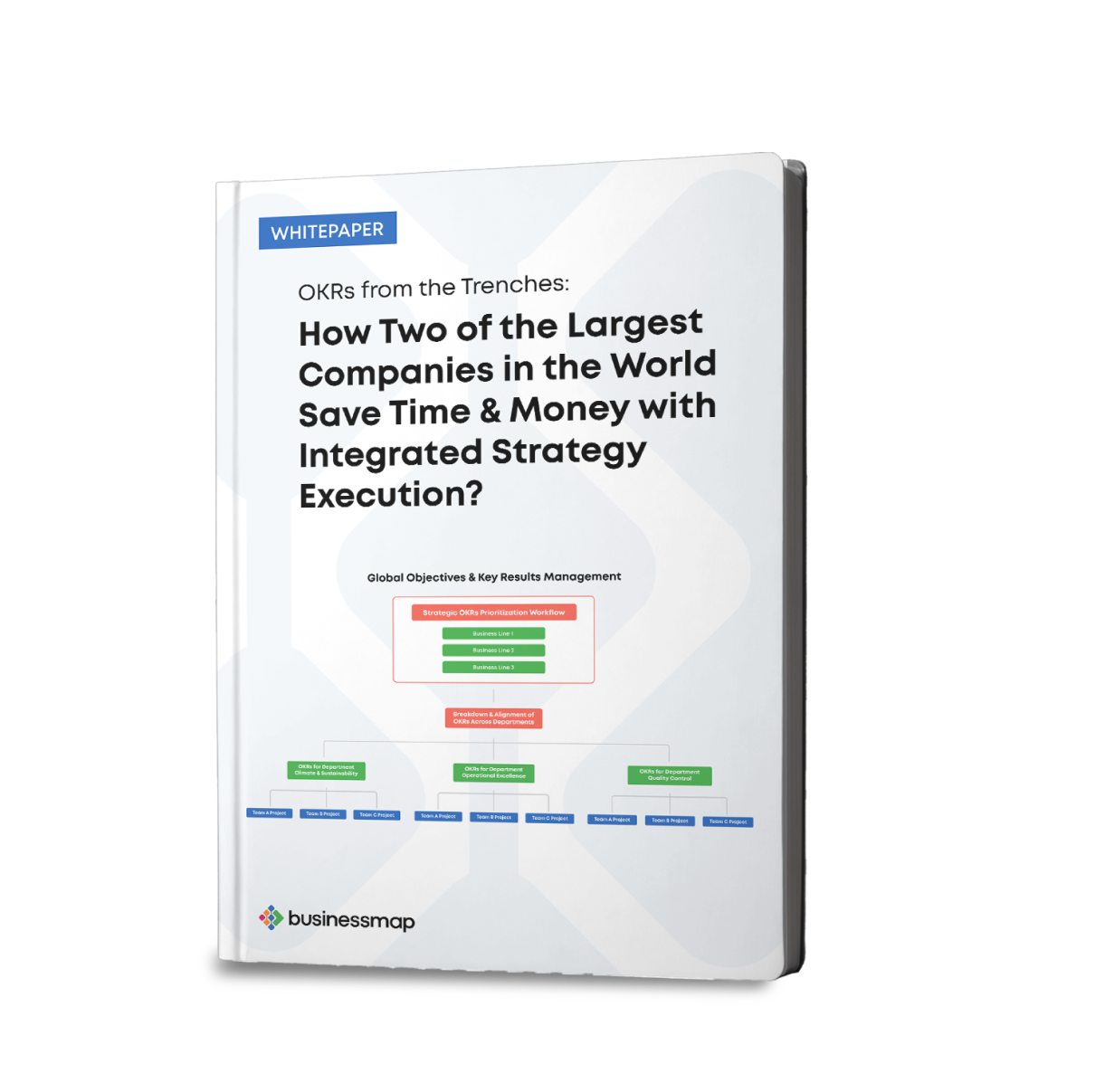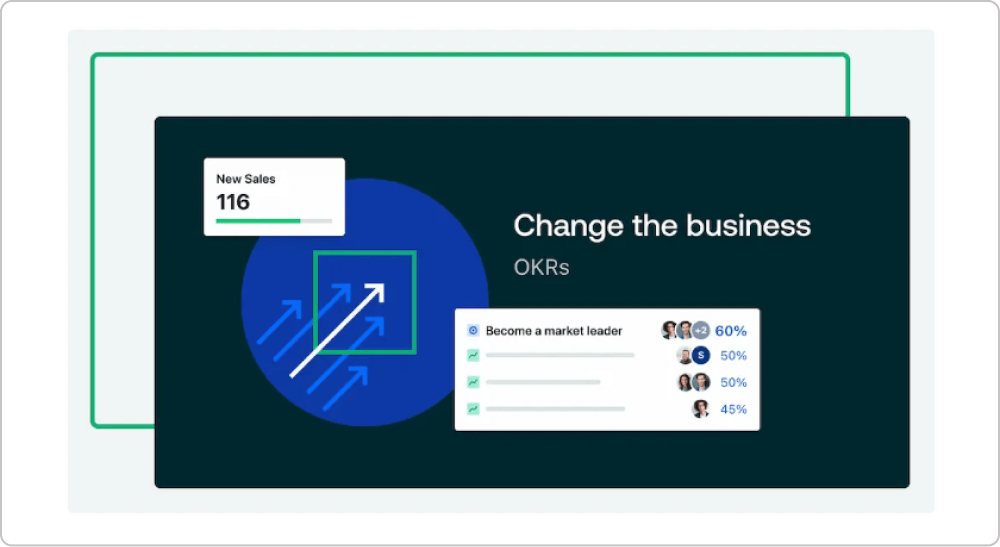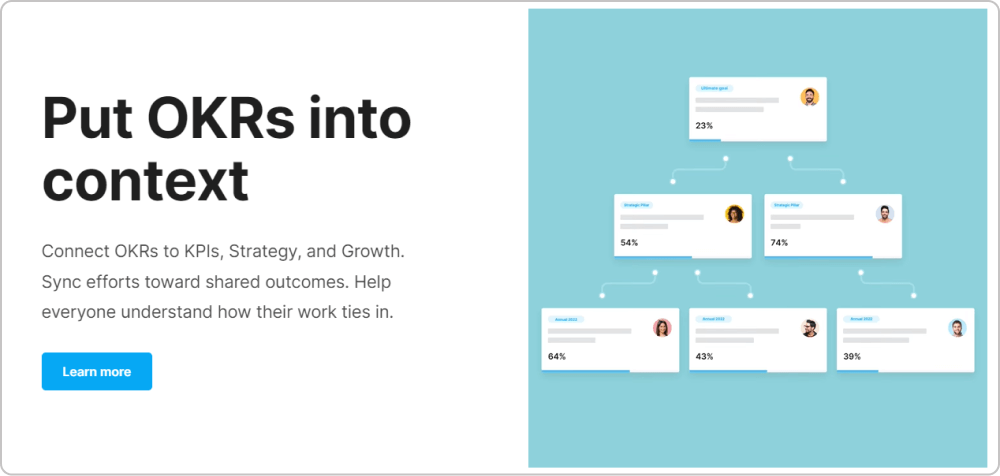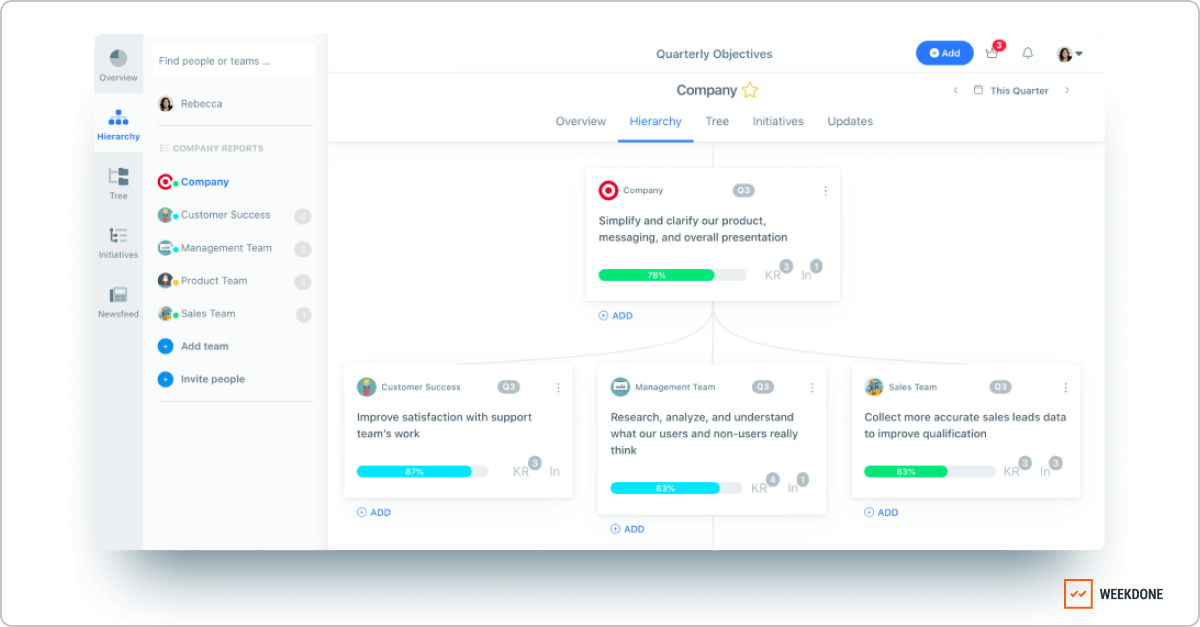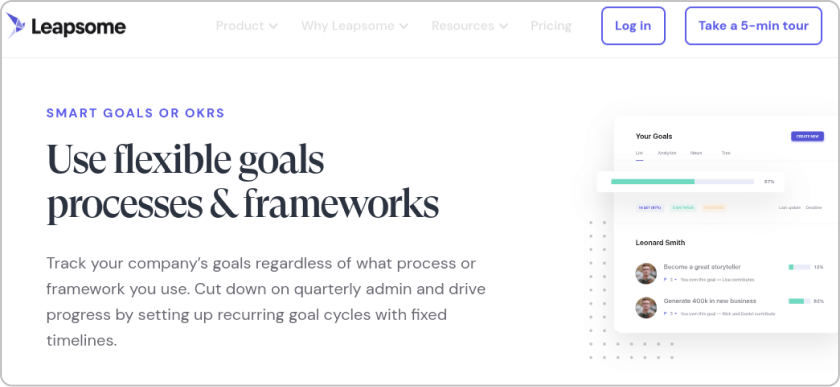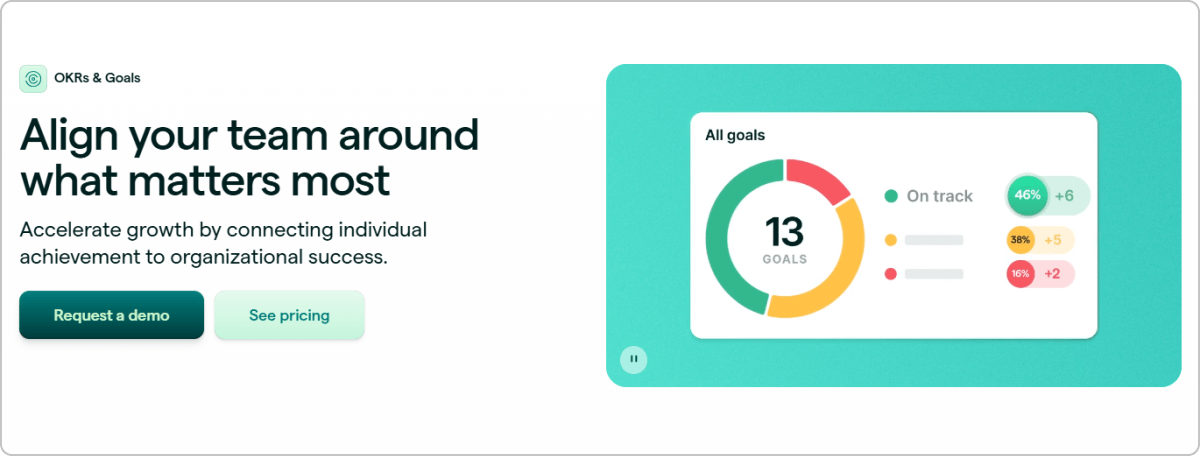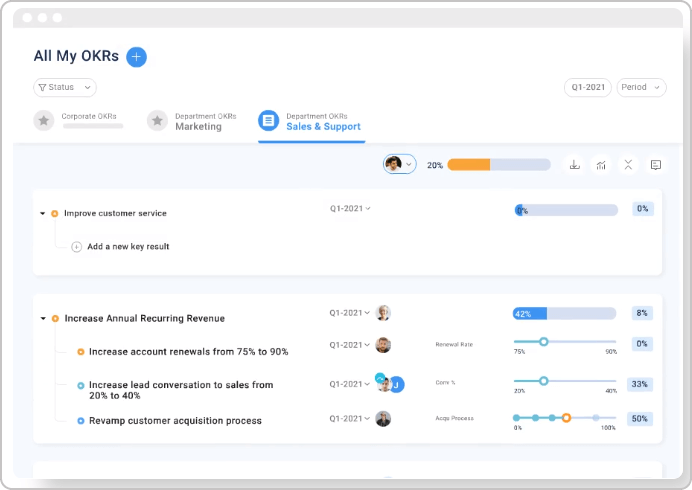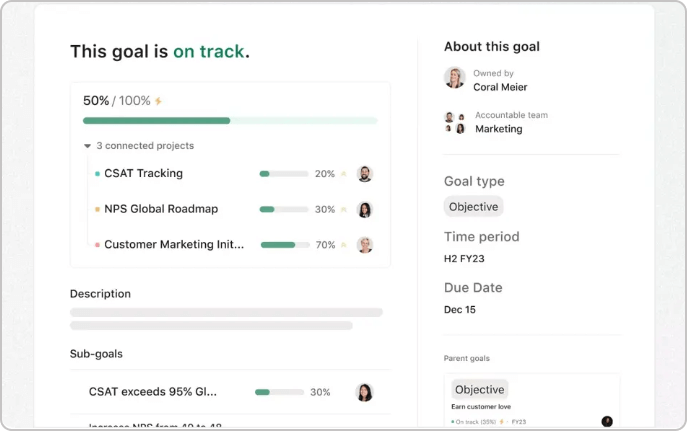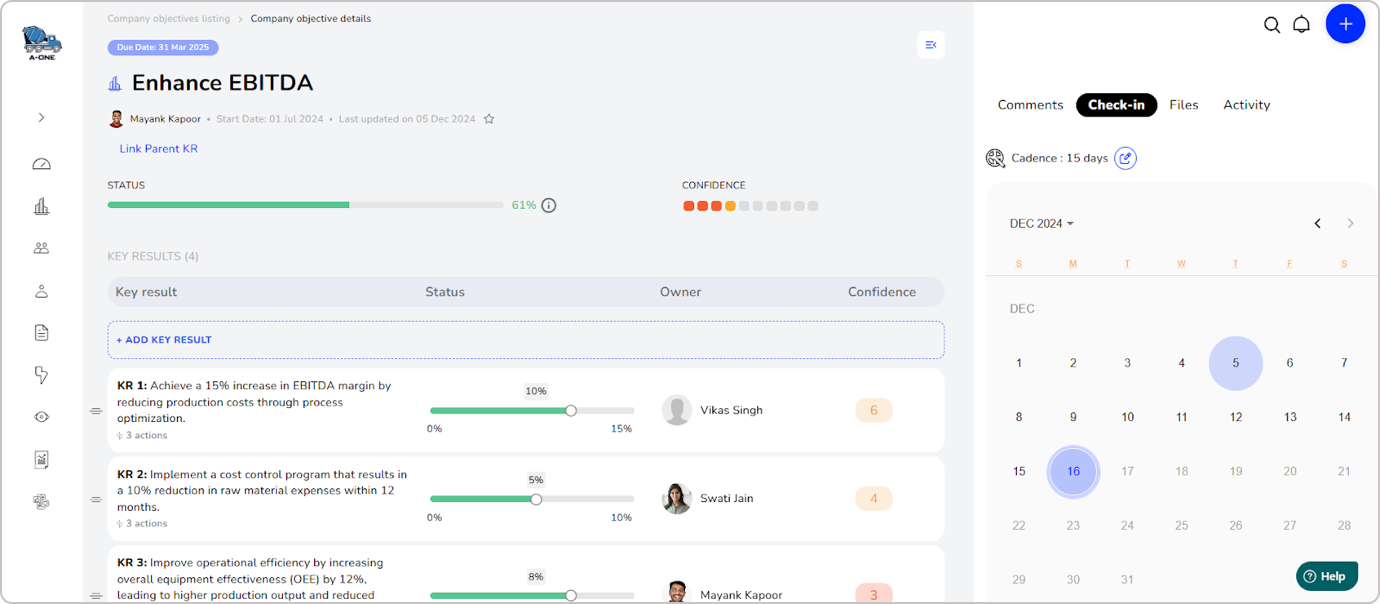Key Takeaways
- OKR software helps teams set, track, and align goals with business outcomes.
- The best OKR platforms connect strategy to execution, enable real-time updates, and support company-wide transparency.
- From free tools to enterprise platforms, the right solution depends on how you work, who's involved, and how fast you want to move.
What Is an OKR Software?
OKR software is a tool helping organizations set, track, and align Objectives and Key Results across teams and departments. It offers clear goal setting, real-time progress monitoring, and collaboration, ensuring everyone stays focused and accountable to the company's goals.
What Are the Key Features of OKR Software?
High-performing OKR software shares these traits:
Company-to-individual alignment
A strong OKR platform helps visualize how individual and team goals contribute to the company's strategic objectives, ensuring alignment across departments.
Connect goals to actual work
A robust OKR system should allow you to tie key results to specific projects, initiatives, or daily tasks, ensuring that goal-setting isn't just theoretical but directly impacts daily execution.
Visual goal tracking
OKR software should provide clear visual representations of goals, dependencies, and progress, helping teams quickly understand priorities and focus areas. Whether via OKR dashboards, goal trees, or Kanban boards, seeing how different OKRs are interconnected is crucial.
Progress updates
A great OKR platform allows users to update goal statuses with minimal effort, ensuring progress is consistently tracked. This could include real-time progress bars, automated check-ins, and intuitive update workflows.
Goal dependency mapping
An effective OKR tool should allow teams to establish dependencies and shared OKRs, ensuring transparency and seamless collaboration.
Built-in analytics & forecasting
Leading OKR software can analyze past performance and automatically predict whether your key results are on track.
Feedback & reviews
The best OKR platforms incorporate team reviews, retrospectives, and feedback loops, making it easier to assess what's working and what needs improvement. Built-in commenting, progress discussions, and review cycles ensure OKRs remain relevant and actionable.
15 Best OKR Software Overviews
The best tools offer powerful visualizations, deep customization, advanced goal tracking, analytics, and seamless integrations to align teams and drive strategic execution.
To help you find the perfect fit, we've categorized 15 top OKR software solutions based on their strengths and unique features.
- Businessmap
- Quantive StrategyAI (now WorkBoard)
- Perdoo
- Weekdone
- Leapsome
- Lattice
- Profit.co
- Asana
- JOP
- Microsoft Viva Goals
- Oboard
- Synergita
- OKRify
- Teamflect
- OKRs Tool
1. Businessmap (formerly Kanbanize)
Businessmap is a Lean strategy execution platform that helps you visualize objectives and key results on shared OKR boards to achieve greater alignment between strategy and execution. By setting high-level company or team goals as Initiatives and linking them to Outcomes, Businessmap provides full transparency into how specific work items contribute to overall progress.
With effortless tracking, dependency visualization, and smooth integrations, it simplifies OKR management across teams. Businessmap combines three solutions into one: OKRs, project portfolio management, and workflow management.
 Objectives and key results' progress indicators
Objectives and key results' progress indicators
Key OKR Features
-
Measurable OKRs: You can set high-level objectives as Initiatives, define their key results as Outcomes, and connect goals to actual work delivery on project boards.
-
OKRs Progress Tracking: Allows you to easily update and track key results, set deadlines, and compare actual vs. expected progress to align daily work with strategic goals.
-
OKRs/Outcome Trends: You get automatic OKR projections of outcome progress based on historical data, helping your teams anticipate when they'll reach their targets.
-
OKRs/Outcome Checkpoints: The OKR checkpoints allow you to set intermediate targets to track milestones throughout an objective's lifecycle and measure progress more accurately.
-
Executive Dashboards: You can monitor all business objectives in a centralized management dashboard, visualize risk levels, compare work vs. goals progress, and accelerate decision-making.
-
Advanced Integrations: Seamlessly connect Businessmap with other tools to enhance OKR tracking and execution.
-
Implementation: Tailor the platform to your organization's unique needs, ensuring a seamless transition to a service-oriented, customer-focused approach.
-
Free Pre-Recorded & Live Demos: Explore a pre-recorded demo or schedule a live demo to explore the full capabilities of Businessmap's OKR tool.
 Visualization of key results' progress using Outcomes in Businessmap
Visualization of key results' progress using Outcomes in Businessmap
“Best tool for managing teams and goals. The most impactful feature of Businessmap (formerly Kanbanize) for me is the ease of extracting efficiency metrics from teams and tracking OKRs, followed by the ease of integration with other tools.”
Karen S., Agile Coach, Capterra user review
How Two of The Largest Organizations in the World Save Time & Money with OKRs?
2. Quantive (now WorkBoard)
Quantive StrategyAI (now WorkBoard) is an AI-powered platform designed to help organizations implement and scale Objectives and Key Results (OKRs). Quantive enables businesses to execute their strategies with real-time insights and automation while continuously assessing and adapting.

Key OKR Features
-
OKR Whiteboards: Facilitate the visualization of goals and key results with sticky notes.
-
Alignment View: Drag and drop alignment view of the OKR hierarchy structure.
-
Key Result Automation: You can use to automate the tracking of key results for progress monitoring.
-
Owners and Co-owners of OKRs: Allow for the improvement of outcomes accountability.
- Pre-Built and AI-Guided Reports
★ Quantive StrategyAI Capterra Rating: 4.7/5
★ Quantive StrategyAI Gartner Rating: 4.6/5
3. Perdoo
Perdoo's goal management tool lets you connect OKRs and KPIs in one place. Using an OKR roadmap, you can visualize how different levels of OKRs connect. The software offers a view of the historical performance of company goals using strategic timelines and various reports. 
Key OKR Features
-
Alignment View: Allows to visualize the connection between your organization's strategy and the supporting goals.
-
Weekly Progress Reports: Help you generate reports to inform teams about their progress toward key objectives.
-
Shared and Private OKRs and KPIs: Control the access to specific OKRs and KPIs.
-
KPI Boards: You can use them to create KPI boards for specific use cases, teams, or departments.
-
Data Export: You can export your goals data into CSV.
★ Perdoo Capterra Rating: 4.3/5
★ Perdoo G2 Rating: 4.4/5
4. Weekdone
Weekdone OKR software puts results on display for the company. Thanks to visual dashboards, graphs, and views – leaders and employees always have eyes on the most important KPIs, metrics, trackable activities and weekly plans. Weekdone supports cross-team collaboration with open Newsfeed, OKR tracking, project updates, public feedback and praise to anyone in the company. Weekdone lets you stay connected and encourages everyone to work toward company goals.
Key OKR Features
- OKR Hierarchy & Company-Wide Linking
- Color-Coded OKR and KPI Progress Dashboards
-
Openly Shared OKRs, Initiatives, and Weekly Plans
- Newsfeed
- Automated Weekly Progress Reports
-
Public Feedback and Praise
- Team Training and OKR Coaching
★ Weekdone Capterra Rating: 4.5/5
★ Weekdone G2 Rating: 4.1/5
5. Leapsome
Leapsome's goals management solution allows you to visualize strategic plans and track their execution regardless of your goal-setting model. Leapsome creates a structure for your personal, team, or organizational goals, visualizing ownership and internal dependencies.

Key OKR Features
-
Individual, Team, Company-Level OKRs: You can share goals with individuals, teams, or the whole company.
-
Progress Timelines: These allow you to track progress toward your goal in real time.
-
Automatic Updates: Set automatic updates and tracking reminders.
- Feedback and Comments Opportunities
- AI-Powered Goal Setting
★ Leapsome Capterra Rating: 4.6/5
★ Leapsome G2 Rating: 4.8/5
6. Lattice
Lattice is a people management platform integrating OKR (Objectives and Key Results) functionality to align employee performance with organizational goals. Lattice's OKR solution enables organizations to set, track, and manage goals offers performance reviews, and 1:1 meeting management, which fosters alignment between individual objectives and organizational strategy.

Key OKR Features
-
Goal Visualization: Provides a clear overview of objectives and their alignment across the organization.
-
Integration with Performance Management: Links OKRs with performance reviews and employee development plans.
-
Customizable Goal-Setting: Allows to customize OKRs to meet various teams' and departments' unique needs.
★ Lattice Capterra Rating: 4.5/5
★ Lattice Gartner Rating: 4.3/5
7. Profit.co
Profit is a software solution that supports strategy execution through OKRs, task, and performance management. The goal-setting software uses a cascading style of objectives and key results visualization to help align everyone with the company goals. You can choose between different types of key results to indicate their completion more accurately. The software offers real-time insights into goals' completion and performance at every organizational level.

Key OKR Features
-
OKR Templates and Workflows: Offers customization options to fit specific needs.
-
Custom OKR Weight: Allows assigning different weights to OKRs and prioritizing accordingly.
-
OKR Alignment: Aligning OKRs and connecting individual tasks to key results.
- Inbuilt KPIs
- Automated Alerts
★ Profit.co Capterra Rating: 4.8/5
★ Profit.co Gartner Rating: 4.7/5
8. Asana
Asana is a project management tool that allows you to organize your tasks, view them differently, automate them, and integrate them with many other software programs. The OKR solution allows you to connect your work to your company goals in one place to monitor progress and keep everyone on track.

Key OKR Features
-
Goals and Sub-Goals: Establish company, team, or individual objectives and visualize how they connect.
-
Project Integration: Link goals directly to relevant projects, portfolios, and daily tasks.
-
Automatic Progress Tracking: Goal progress is updated in real-time.
★ Asana Capterra Rating: 4.5/5
★ Asana Gartner Rating: 3.9/5
9. JOP
JOP is a leading provider of OKR and continuous performance management software solutions designed to align business and people performance and accelerate growth. With a strong emphasis on cutting-edge technology and exceptional service, JOP helps organizations streamline operations, enhance efficiency, and achieve high performance.

Key OKR Features
- OKR-Based Goal-Setting
- OKR-Aligned Actionable Items
- Real-Time Two-Way Feedback & Recognition
- Action Creation with AI-Assisted OKRs
-
Anonymous Surveys as well as check-in notes
★ JOP Capterra Rating: 4.6/5
★ JOP Gartner Rating: 4.6/5
More OKR Software Apps and Plugins
10. Microsoft Viva Goals
Microsoft Viva Goals is a goal-setting solution that aligns teams with an organization's strategic priorities. Built on the Objectives and Key Results (OKR) framework, it connects teams to strategic priorities, timelines, and goals. Users praise Microsoft Viva Goals for its seamless integration with the Microsoft ecosystem: Teams, Outlook, and SharePoint, which enhances workflow efficiency and centralizes goal management.
However, with Microsoft's decision to retire Viva Goals by late 2025, many organizations are now exploring what can fill the gap. If you're looking for an alternative, here's how Businessmap can serve as a good replacement for Viva Goals.
11. Oboard
Oboard or OKR Board is an OKR plugin that integrates with Atlassian's Jira and Confluence platforms and Salesforce. This tool enables organizations to implement the OKR framework within their existing workflows. Oboard is highly praised for its seamless integration capabilities, particularly within Jira environments, which offer an efficient service focusing on transparency and client interests.
12. Synergita
Synergita is an OKR management software that offers features such as a powerful hierarchy tree for visualizing goal alignment, customizable OKR templates, and real-time progress tracking to ensure clarity and cohesion across all levels of the organization.
13. OKRify
The AI-powered Salesforce app is designed to streamline the management of OKRs, KPIs, scorecards, contests, meetings, and employee recognition within the Salesforce platform, where OKRs can be managed through a central hub.
14. Teamflect
The all-in-one performance management software is praised for its user-friendly interface and seamless integration with Microsoft Teams. It enables organizations to define and track goals, conduct 1-on-1 meetings, perform performance reviews, and provide feedback and recognition, all within the Microsoft Teams environment.
OKRs Tool is a goal-setting software built specifically for startups that want to stay focused. It simplifies goal-setting, tracking, and alignment through a clean interface and smart AI assistance. It's a lightweight and cost-effective solution for fast-moving startups that need to adapt quickly, track progress in real time, and maintain momentum as they grow.
Best OKR Tools Compared
| Software |
Key Features |
Pricing & Trial |
Best for |
| Businessmap |
Visual OKR boards, AI-assisted goal-setting, measurable Outcomes, advanced analytics, workflow automation, integrations |
From $9.90/user/month (annually)
Custom enterprise pricing
14-day free trial/pre-recorded & live demos available
|
Enterprises and scaling teams aligning strategy to execution |
| Quantive (WorkBoard) |
AI-powered OKR tracking, automation, alignment view, advanced reporting |
Custom pricing
Personalized demo available
|
Organizations seeking AI-assisted goal management |
| Perdoo |
OKR & KPI tracking, alignment view, reports, data export |
Free plan for up to 5 users
Free trial available
From $9/user/month (annually)
|
Mid-size companies connecting strategy with performance |
| Weekdone |
OKR & KPI dashboards, OKR hierarchy, automated reports, public feedback |
Free plan for up to 3 users
14-day free trial
From $9/user/month for teams of up to 10 (annually)
|
Startups and SMEs looking for transparent goal tracking and communication |
| Leapsome |
Individual, team, company goal visualization, AI-powered goal setting, feedback and reviews |
Custom pricing
Module based
1-year minimum term contract
14-day free trial
|
Companies looking to link OKRs with performance management |
| Lattice |
Cascading alignment, visual progress tracking and dashboards, integrations |
Custom pricing
From $8/user/month for the Goals, OKR, or Performance modules
Interactive tours available
Annual contracts only
|
Companies looking for people management, goal setting (OKRs), and employee engagement tools |
| Profit.co |
Custom OKR templates, weighted OKRs, inbuilt KPIs, analytics |
Custom pricing
Module based
Add-ons available
30-day free trial
|
Teams looking for real-time KPI and OKR alignment |
| Asana |
Connects OKRs with projects, auto progress tracking |
$24.99/user/month (annually) for the Goals feature
Custom pricing for the Enterprise and Enterprise+ plans
|
Cross-functional teams using OKRs for project management |
What Are the Benefits of Using OKR Software
Your organization should use OKR software for several reasons:
Align Strategy with Execution
OKR platforms help you translate big-picture goals into trackable, measurable outcomes. When objectives are tied to real projects, everyone knows what matters - and why. No more guessing where your efforts are going.
Improve Team Collaboration and Visibility
Shared OKRs break down silos. With centralized dashboards, team members can align on shared goals, track progress in real time, and stay focused on what drives results. Whether you're syncing with developers or stakeholders, everyone is on the same page.
Make Faster, Smarter Decisions
With built-in analytics and progress indicators, OKR tools show what's working - and what's not. You get early warnings when key results stall, and the ability to course-correct before timelines slip or budgets balloon.
Prioritize High-Impact Work
Instead of chasing every task, OKR platforms help project teams focus on what truly moves the needle. Align initiatives to strategic outcomes, filter out the noise, and accelerate delivery on what really counts.
Build a Culture of Accountability and Engagement
When goals are transparent and outcomes are visible, ownership follows. Teams understand how their work contributes to business growth - and that clarity drives motivation, performance, and retention.
FAQs
Do OKR platforms offer integrations with tools?
Yes. Most top-tier OKR platforms plug into your existing ecosystem:
- Businessmap integrates with Jira, Google Workspace, Azure DevOps
- Asana connects project work to goal progress
- Oboard embeds OKRs into Jira/Confluence
- Integrations bring OKRs from a separate system into your daily workflow
How much does OKR software cost? Are there free trials or demo versions available?
Pricing ranges from free (Google Sheets, Asana basic) to enterprise (custom pricing). Most vendors offer:
- Free trials (7-30 days)
- Freemium tiers for small teams
- Live or pre-recorded demos for enterprise buyers
Want to test before you commit? Businessmap, Weekdone, and Perdoo offer both live demos and free trials.
Can the software handle cascading OKRs and goal alignment from company to individual levels?
Absolutely. That's core functionality:
- Businessmap visualizes OKRs as initiatives (company/team) linked to outcomes (key results)
- Leapsome and Lattice track goals from individual to the company level
- Weekdone color-codes cascading OKRs for instant alignment checks
Is it possible to migrate data?
Yes. Most OKR platforms support:
- CSV data import
- API integrations for legacy system migration
- Onboarding assistance
If you're switching platforms, ask about migration services - vendors like Businessmap offer tailored onboarding.
How secure is the platform?
Security features to expect:
- SSO (Single Sign-On)
- Role-based access control
- GDPR & SOC2 compliance
- Data encryption at rest and in transit
Security is non-negotiable. Look for platforms with enterprise-grade compliance.
Can the vendor provide a product demo or proof of concept?
Yes. Most vendors offer:
- Pre-recorded demos (fast)
- Live demos (guided, interactive)
- Proof of concept setups for enterprise clients
Businessmap offers a pre-recorded walkthrough, a self-guided product tour, and a live demo to explore the fit.
How can I evaluate the ROI of investing in an OKR platform?
Look at:
- Time saved managing goal-setting cycles
- Alignment metrics (fewer missed targets, more strategic focus)
- Engagement gains from visibility and collaboration
- Execution speed (less delay between planning and doing)
Platforms like Businessmap and Quantive include built-in analytics to track ROI in real time.
Are there free OKR tools?
Yes. Two of the best free OKR tools are Google Docs and Google Sheets. Google offers robust and complementary resources for monitoring OKRs. Employing Google Docs or Google Sheets presents a hassle-free and readily available approach to tracking your OKRs.
Leveraging Google's productivity suite, particularly Google Docs and Sheets presents a valuable opportunity for smaller teams. However, when seeking to implement objectives and key results (OKRs) across a larger enterprise, it might be necessary to consider investing in a paid OKR software tool. Such tools can provide robust functionality and scalability to support the multifaceted needs of a more extensive organization.
What is the best OKR software?
The best OKR software depends on your team's size, structure, and existing tools. If you want full visibility from strategy to execution, Businessmap stands out. Quantive (now WorkBoard) delivers AI-powered automation. Looking for people-first platforms? Explore Leapsome or Lattice.
Ready to see Businessmap in action?





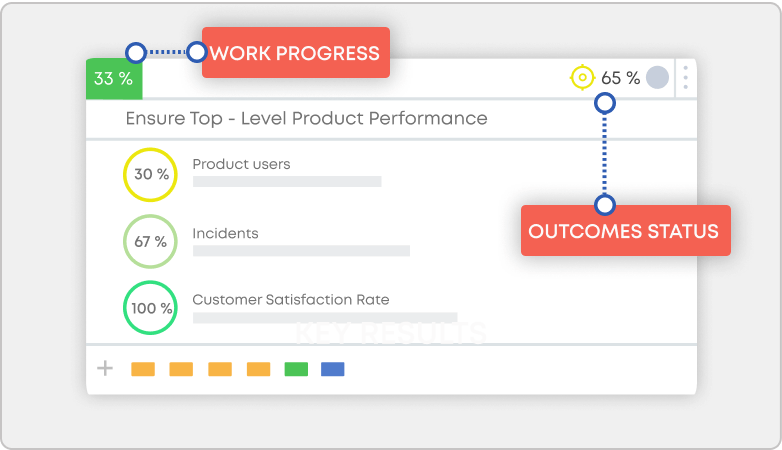 Objectives and key results' progress indicators
Objectives and key results' progress indicators